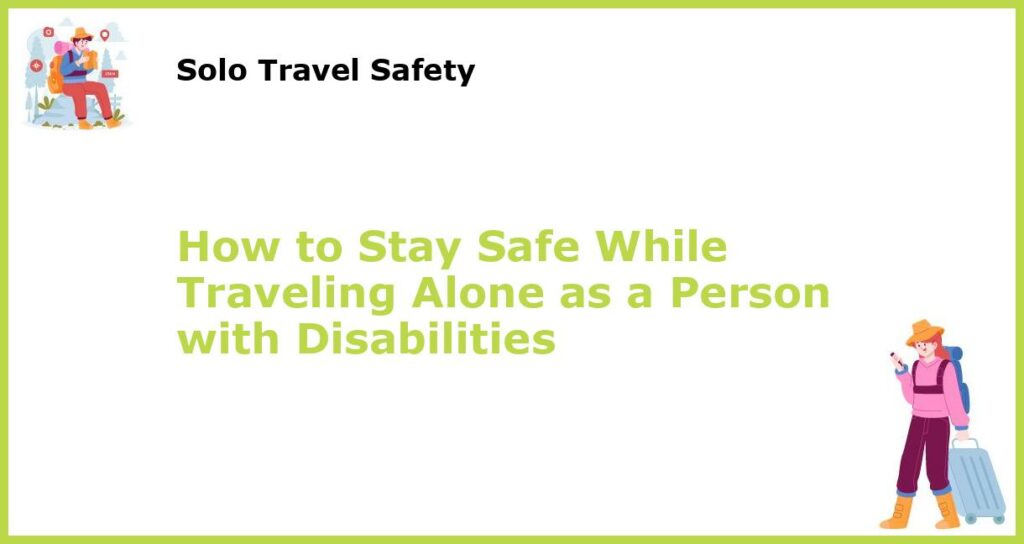Traveling alone can be an incredibly exciting experience, but it can also come with its challenges. As a person with disabilities, it’s essential to take extra precautions to ensure your safety and comfort while on the go. From planning your trip ahead of time to building relationships with locals or tour guides, these tips can help you stay safe while traveling alone.
Plan Your Trip Ahead of Time
Planning your trip ahead of time is crucial when traveling alone as a person with disabilities. One of the first things you should do is research your destination and accommodations to ensure they can accommodate your specific needs. This can include things like wheelchair accessibility, bed height, shower configurations, and more. Additionally, plan your transportation to and from the airport in advance to avoid any potential issues that may arise. Finally, don’t forget to pack any necessary medical equipment and medication you may need, and consider packing extra supplies in case of delays or unexpected situations.
Invest in Travel Insurance
Investing in travel insurance is essential when traveling alone as a person with disabilities. Not only can it protect you from unexpected accidents or medical emergencies, it can also provide peace of mind knowing you’re covered in case something does happen. Before you purchase travel insurance, be sure to read the fine print to fully understand what is covered and what is not.
Notify Your Hotel or Accommodation of Your Needs
It’s important to inform your hotel or accommodation of your specific needs before arriving. Making these arrangements ahead of time can help ensure that your stay is as comfortable and safe as possible. When making reservations, be sure to request any accommodations you may need, such as wheelchair accessibility, bed height, or shower configurations.
Bring Necessary Medical Equipment and Medication
When traveling alone as a person with disabilities, it’s essential to bring all necessary medical equipment and medication with you. This can include things like wheelchairs, walkers, or inhalers. Be sure to pack extra supplies in case of unexpected delays or emergencies. Additionally, if you’re flying, be sure to check with your airline to ensure that you’re following all rules and regulations regarding bringing medical equipment and medication onboard.
Choose A Well-Lit and Busy Neighborhood
Choosing a well-lit and busy neighborhood is essential to a safe trip when traveling alone as a person with disabilities. You’ll want to stay in a neighborhood or hotel that is well-lit, has plenty of foot traffic, and is well-connected to public transportation. When researching your destination, be sure to check out online reviews of different neighborhoods to find the one that best suits your needs.
Take Precautions When Using Public Transportation
When using public transportation, take precautions to ensure your safety. Arrive early to give yourself plenty of time to board, use designated accessible seating, and avoid rush hour when possible. Additionally, research the accessibility of public transportation at your destination before booking your trip. This can help you plan your itinerary and ensure you’re able to get where you need to go without any difficulties.
Stay Alert and Aware of Your Surroundings
Remaining alert and aware of your surroundings is essential when traveling alone as a person with disabilities. Be mindful of any potential dangers, scams, or pickpocketing attempts. Keep your belongings close to you at all times and avoid flashing valuables in public. If you sense that someone is following you or something doesn’t feel right, trust your instincts and take action to ensure your safety.
Have Important Phone Numbers and Documents Handy
Having important phone numbers and documents on hand is crucial when traveling alone as a person with disabilities. This can include copies of your passport, visas, insurance policies, and emergency contacts. Keep these documents in a secure location, such as a hotel safe or a locked suitcase, and make sure you can easily access them if needed.
Build Relationships with Locals or Tour Guides
Building relationships with locals or tour guides is an excellent way to stay safe and have a great trip. Ask your hotel staff for recommendations on accessible tours or activities, seek out local groups or social media forums for travelers with disabilities, and don’t be afraid to connect with other travelers online. By doing so, you’ll be able to get insider tips and advice on the best sights to see, where to eat, and how to stay safe in your destination.
Trust Your Gut and Take Breaks When Needed
Finally, it’s essential to trust your gut and take breaks when needed when traveling alone as a person with disabilities. If something feels off or uncomfortable, take a break and evaluate your situation. Don’t be afraid to ask for help or modify your travel plans to suit your specific needs. By doing so, you’ll be able to enjoy your trip and stay safe and comfortable throughout your journey.








 You might also be interested in those articles related to solo traveling
You might also be interested in those articles related to solo traveling